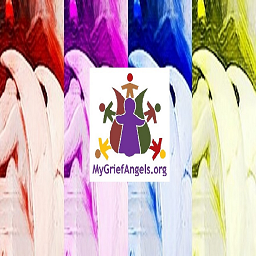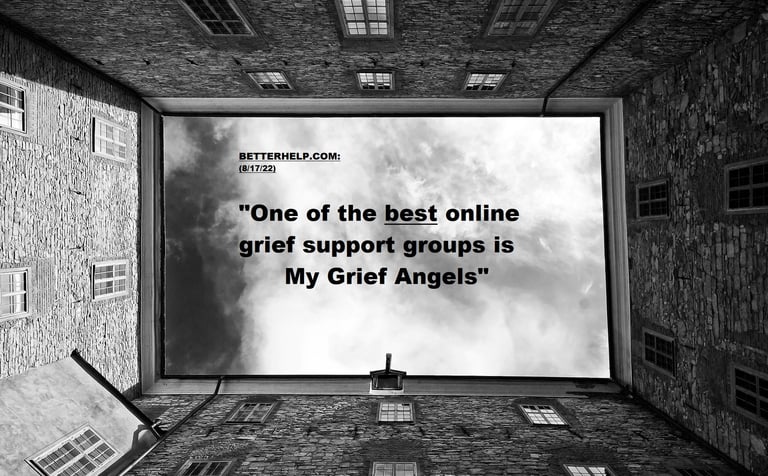Special Needs Child Loss


Informational and Educational Resources for Anyone Who Has Lost a Special Needs Child of Any Age


Wednesday - 7PM EST/NYC Time -Open Free Virtual Peer-led Grief Support For Those Grieving the Loss of A Child Of Any Age - Open groups do not require mandatory weekly attendance - Participants join when they are up to it and they are welcome every week or whenever they are up to it. To register for the free group and the specific date you are interested in attending, please go to the zoom link below:
https://us02web.zoom.us/meeting/register/tZYpc-CspjIoG9OkmW63VIt1gW6_r5uUGA8O#/registration





Dying Matters - "Like everyone else, people with learning disabilities need to be able to acknowledge their loss and be able to mourn when someone close to them dies.
In this 15 minute film, people with learning disabilities tell their stories and share their wishes to support other people with learning disabilities in becoming more comfortable talking about dying, death and bereavement."

“Grief and Bereavement: Supporting People with Developmental Disabilities"
https://connectability.ca/2015/03/09/grief-and-bereavement-2/
Death is something that we all have to face at some point in our lives. Knowing more about the feelings and thoughts that come after the death of someone close to us can help us and the people we support.
This presentation will focus on the grief that comes after someone dies.
This presentation is for general information only.
If you have any concerns regarding yourself or someone you are supporting, please contact a healthcare professional. If you are in crisis please contact your local crisis line or access emergency services.
Directory of Grief Support Resources for People with Disabilities and their Caregivers
GENERAL
The Boggs Center on Development Disabilities
https://rwjms.rutgers.edu/boggscenter/about/overview.html
"The Boggs Center is New Jersey’s federally designated University Center for Excellence in Developmental Disabilities and is part of Rutgers Robert Wood Johnson Medical School, Department of Pediatrics. Since its inception in 1983, The Center has emphasized a community based, lifespan approach to meeting the needs of individuals with developmental disabilities and their families.
The Boggs Center provides community and student training and technical assistance, conducts research, and disseminates information and educational materials. Activities of The Boggs Center are guided by our Consumer Advisory Council, and partnerships with people with disabilities, families, state and community agencies, and policy makers.
Boggs Center Resources about Grief and Loss
https://rwjms.rutgers.edu/boggscenter/links/COVID-19Resources.html#GriefandLoss
"Someone once observed, “All grief is like all other grief,some other grief,no other grief.”
This is universally true but no more so than in the lived reality of persons with intellectual and developmental disabilities (IDD).
While there is general information available on grief and loss from a wide variety of sources, information pertaining to the sometimes unique complexities of mourning for a person with IDD can be harder to find.
Below are some resources that may prove helpful as you strive to compassionately support people in your life who are experiencing loss and processing grief.
Resources:
Intellectual/Developmental Disabilities and Grief, Death, & Dying (English)
Responding to Grief Reactions of People with Intellectual and Developmental Disabilities (English)
SPANISH Version/En Español - Click Here
Ritualizing Grief with People with Intellectual and Developmental Disabilities (English)
SPANISH Version/En Español - Click Here
Helping People with Intellectual and Developmental Disabilities Process Grief (English)
SPANISH Version/En Español - Click Here "
Chimes
Baltimore, MD
"Chimes is a not-for-profit organization that assists people with intellectual and behavioral challenges to achieve their fullest potential...Since its founding in 1947, Chimes has endeavored to assist people with intellectual and behavioral challenges to achieve three main goals:
- to live as independently as possible, guided by choice.
- to understand, respond to and achieve the potential of their capabilities.
- to serve as productive, contributing members of their community."
SUPPORTING BEREAVED PEOPLE WITH LEARNING DISABILITIES
https://sudden.org/tools/supporting-bereaved-people-with-learning-disabilities/
"When people with learning disabilities are bereaved,
their grief is often unrecognized and unsupported.
People with learning disabilities may be excluded from conversations about death and dying, and may have limited experience of the events and processes that follow a death, such as funerals. Despite this, people with learning disabilities experience grief in a similar way to people without learning disabilities...
Stigma and exclusion
People with learning disabilities are often excluded at the end of a friend or loved one’s life. This exclusion can make the death sudden, as opposed to anticipated, shocking and unexpected, and can cause problematic grief responses. A lack of social support can result in strong emotional reactions, such as guilt, anger and feelings of powerlessness.[12]
Social context and death
The social context of a death can also affect how someone responds to bereavement. A supportive environment, where grief is facilitated, can help people process loss in a healthy manner.
When people are prevented from communicating about bereavement, challenging grief responses can develop. Unfortunately, this can often occur for bereaved people with learning disabilities.
How do people with learning disabilities experience grief?
Bereaved people with learning disabilities will have typical reactions like anger, denial, sadness and guilt, and experience grief in a similar manner to people without learning disabilities.
However, bereaved people with learning disabilities often struggle to express and articulate their grief in a meaningful way.
Support workers should be aware that any behavioural changes after a bereavement may indicate distress."
Ableism
"What Losing My Disabled Mom Taught Me About Ableism.
Plus, how it informs the pandemic.
https://www.self.com/story/live-in-caregiver-grief
"I carry guilt for making my mom invisible, but I also see how I internalized larger societal views. This dichotomy makes me think about younger caregivers who, in the face of a global pandemic, might not have the confidence, access, or stamina to confront an already strained health care system.
I fear that the newly bereaved will feel isolated in their grief, as I have. But my hope, as new caregivers emerge en masse and many people become mourners, is that society begins to dismantle the ableist infrastructure that impedes health—and that we as caregivers have the courage to do the same."
Autistic
"COVID-19 guide for care staff supporting adults with learning disabilities or autistic adults
Death and bereavement:
The current crisis means there is a lot of discussion of death in the media, and there is an increased chance that everyone, including people with a learning disability or autistic people, will experience the death of a family member, housemate, or friend. It may be tempting to try and shield people with a learning disability or autistic people from upsetting subjects such as death, but generally this is not helpful.
People with a learning disability and autistic people, of course, experience grief, and having a learning disability or autism does not mean that a person cannot understand or deal with bereavement. Each person will grieve in their own way and it is important to take a person-centred approach to support them through this process. Having open and honest discussions about death is often the best approach. It is generally advisable to avoid euphemisms like ‘gone to sleep’ or ‘gone to a better place’, which can cause confusion, especially with someone people who may interpret such comments very literally. Do not be afraid of showing your own emotions while supporting someone through a bereavement. People with learning disabilities can feel supported by seeing that you are upset too, but be prepared to explain the reasons for such emotions. It may be useful to have conversations about death before people have personal experience of it. Media discussions of deaths due to coronavirus could be a way to start these conversations."
Autism Speaks - Grief & Bereavement Resources
https://www.autismspeaks.org/grief-and-bereavement-resources
"Supporting Individuals on the Autism Spectrum Coping with Grief and Loss through Death or Divorce"
Indiana University - Indiana Institute on Disability and Community
Intellectual Disability
"How Do People with an Intellectual Disability Grieve?
https://exploringyourmind.com/people-intellectual-disability-grieve/
Death and loss are difficult for anyone to deal with, and the grieving process is often painful. But how is this process in people with an intellectual disability and what can you do to help them?"
"An exploratory study of self‐reported complicated grief symptoms in
parentally bereaved adults with intellectual disability"
https://onlinelibrary.wiley.com/doi/abs/10.1111/jir.12812
Conclusion: Study has demonstrated the capacity of people with ID to self‐report personal experience of symptoms of complicated grief, when appropriate and accessible assessment tools are used. Some symptoms were more evident among bereaved individuals (compared with non‐bereaved participants), and they tended to be from separation distress criteria. This may indicate the relevance of these symptoms for people with ID and question the existing criteria for PCBD in this population, which may have clinical implications for supporting people with ID experiencing a more complicated bereavement response."
Learning Disabilities
Beyond Words Empowering People Through Pictures:
"Let's talk about when someone is ill or dies from the coronavirus for people with learning disabilities" - Free Download / Pictures - Images and suggested questions to prompt discussion about the impact of coronavirus on people's lives, and especially the impact of people dying from coronavirus.
"When Someone Dies from Coronavirus - A guide for family and carers.
An illustrated resource on how to respond when somebody dies from coronavirus and coping with grief and bereavement. Aimed at family and carers.
(- Nederlandse vertaling // - Traducción Española)"
"Good Days and Bad Days During Lockdown"
A wordless booklet with scenes from existing Beyond Words stories looking at what makes a ‘good day’ and what makes a ‘bad day’.
Scenes address social distancing, lockdown, mental health and daily routines.
(- Traducción Española)"
